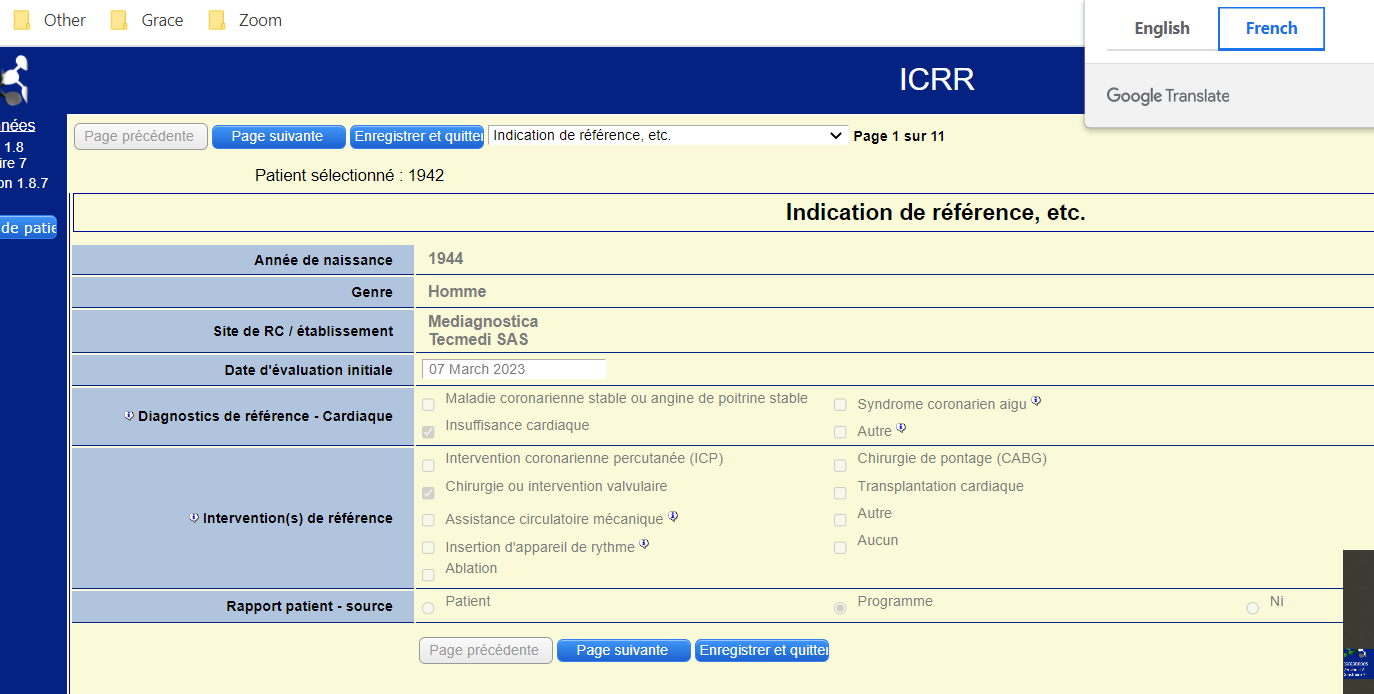
ICRR Variables and Data Dictionary
Dear cardiac rehabilitation (CR) community:
A delphi panel comprised of experts globally (see list below) in CR registries, quality indicators and delivery in low-resource settings has worked together to develop this variable list and data dictionary for the ICRR.
Click here to access the data dictionary
Click here for a summary of how the data dictionary was developed, as well as the registry itself.
You will see in the file the source of data (program or patient) in blue font, and assessment point (pre CR, post-CR or 1 year) in yellow highlight. Please note there is also a program survey which assesses structural program indicators (see here) to reduce any redundancy in variables to enter.
The list of variables was first generated by collating variables from existing registries, as listed at the bottom of this page. In a first round, delphi panelist rated each of ~36 variables on several domains and suggested potential additional variables. On a call, consensus was reached on what variables to exclude and add. In a second round, panelists provided input on the definition of each variable, and the indicators for dashboards. A month-long public comment period ensued.
In the final list, there are 13 program-reported variables and 16 patient-reported for the ICRR (12 of which are assessed at 3 time points, namely pre-CR, post-CR and annually from pre). Variables include patient sociodemographic characteristics (e.g., sex, age, education, supports, other socioeconomic indicators), clinical characteristics (e.g., referral diagnosis and /or procedures, comorbidities), treatment received (e.g., any home-based, program utilization), and outcomes (e.g., functional capacity, work status, risk factors, health behaviours [medication adherence, tobacco use, diet, exercise], quality of life, cardiac symptoms, morbidity and mortality).
The ICRR registry is in English. However, the registry is on the web, and you can use the embedded Google Translate in the Chrome browser to translate the registry pages to your first language, as shown in the example screenshot below. This also translates patient-reported variables which you can then convey to patients interview-style. We can also use Google Translate to translate all email correspondence with you, meeting agendas, and registry-related documents to support you in your engagement with the Registry. This also works for the patient lay summary within the registry among other features, but not for all the outcome dashboards (however we can translate our ‘ancillary features file’ with Google so you can interpret what is shown.

However, we understand that to secure ethics approval, sites may need to have the registry information letter and / or consent form in another language. Moreover, we have the patient-report questions for the pre-program, progress/post-program and annual assessments survey style, which sites are welcome to use in another language if they do not wish to use the text/email versions through the ICRR (which are only available in English) or administer those questions interview style. At this time, these patient materials for the registry have been translated to Brazilian-Portuguese (courtesy of Dr. Gabriela Ghisi), Malay (courtesy of Dr. Leong Be Kim), Persian (courtesy of Dr. Masoumeh Sadeghi), Spanish (courtesy of Lidia Viridiana Rodriguez Gonzalez and Drs. Pamela Seron Silva and Francisco Lopez Jimenez), Urdu (courtesy of Drs. N Soomro, F. Hasnain and B. Adeel), Marathi and Hindi (courtesy of Mariya Jiandani), Tamil (courtesy of Priya Chockalingam), Czech (courtesy of Bat'alík Ladislav) and Arabic (courtesy of Dr. Karam Turk-Adawi); translations to Gujarati and French are underway.
Unfortunately ICRR does not have funding at this time to pay for translation, or to pay to have the translated surveys administered electronically. However, we are delighted to work with sites to develop other translations using best practices but without a professional translator. Please be in touch so we can discuss.
We gratefully acknowledge the following panelists for their service in creating this: Drs. Karam Turk-Adawi (co-chair), Mohiul Chowdhury (trainee), Alexander Harris & Patrick Doherty (NACR UK), Susan Dawkes (BACPR); Simon Attila (EuroCaReds); Marianna Garcia Saldivia (Mexican registry); Robyn Gallagher (Australian registry and QIs; ICCPR Chair), Emma Thomas (Australian registries); Randal Thomas (AACVPR QIs), Margret Leosdottir (SWEDEHEART SEPHIA registries); Evangelia Kouidi (EuroCaReds), Stefan Farsky (Slovak Republic); Jamal Uddin (Bangladesh PT Assoc); Raghdah Aljehani (Saudi Arabia, PMR), Urvi Sheth (India CR), Graciela Gonsalvez (South American CR WG); Masoumeh Sadeghi (Iranian Heart Foundation); Marta Supervia (SORECAR, ESPRM, ISPRM); Claudia Anchique Santos (South American CR WG); Abraham Babu (India, PT, ICRR User Grp chair); Tee Joo Yeo (Singapore), Martin Heine (S. Africa), Jeemon Panniyammakal (India), Rongjing Ding (China).
About the associationThe International Council of Cardiovascular Prevention and Rehabilitation (ICCPR) was created in 2010 to bring together associations dedicated to the promotion of cardiovascular disease prevention and cardiac rehabilitation globally. A named Board member from each association serves on our Council, which meets quarterly. ICCPR is an Associate International Member of the World Heart Federation. |
Copyright © 2010 International Council of Cardiovascular Prevention and Rehabilitation (ICCPR). All Rights Reserved.